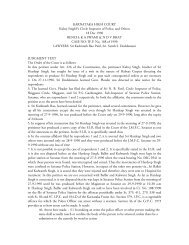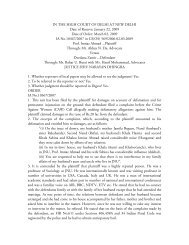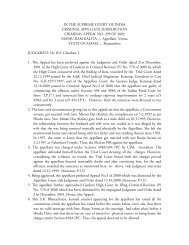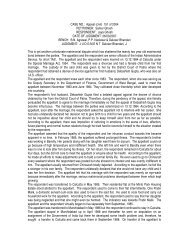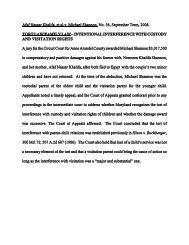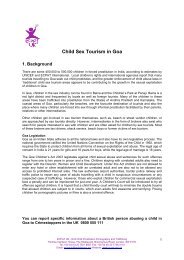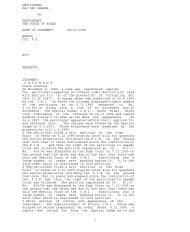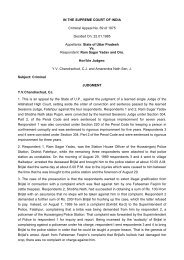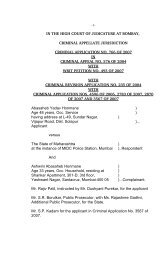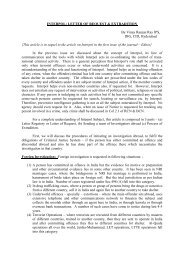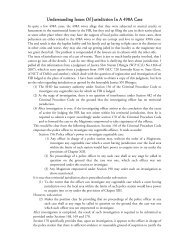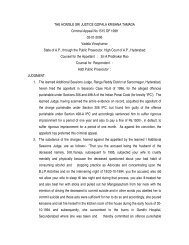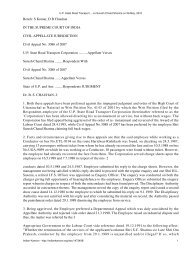THE HINDU MARRIAGE ACT, 1955 - IPC 498A
THE HINDU MARRIAGE ACT, 1955 - IPC 498A
THE HINDU MARRIAGE ACT, 1955 - IPC 498A
You also want an ePaper? Increase the reach of your titles
YUMPU automatically turns print PDFs into web optimized ePapers that Google loves.
<strong>THE</strong> <strong>HINDU</strong> <strong>MARRIAGE</strong> <strong>ACT</strong>, <strong>1955</strong>BOTHthe chief characteristics of Hindu marriage, uiz., polygamyand indissolubility of marriage have been swept away by the HinduMarriage Act, <strong>1955</strong>. The Act makes (a) monogamy a rule oflaw for all HindusY1 and (b) divorce available to all Hindus. Itlays down as a pre-condition of Hindu marriage that neither partyto the marriage should have a spouse living at the time of themarriage: bigamy has been made a penal offence and section 494of the Indian Penal Code has been made applicable to Hindus.'?The Act also repeals all the existing forms of Hindu marriage': Pleader. Rajaqthan High Court, .Taipur, alrd J~ecturer, University Lalv Colleyr . Jaipur. s. 9 of the H~ndu RIarriage Ict defines Hindu. The section runs:" (1) This Act applies : (aj to any person n-110 is a Hindu by religion in any of its forms (11.tlevelopments, including a Virashaiva, a Tingayat 01. :t folloner of the Brnh~~~oPrathnana or Arya San~aj;ib) to any person who is a Buddhist, Jain or Sikh bv religion; and(c) to any other person donliciled in the territories to uhich this Actextends who is not a lluslim, Christian, Parsee or Jelr- by religion, unleszit is proved that any such person n.ould not have bepn governed by the Hini111lalv or by any custom or usage as part of that law in respect of sng- vfthe matters dealt n-ith lierein if this Act had not bezn passed."Zsplanation: The folioning persons are Hindus, Buddhists, Jairls orSikhs by religion, as the casc niap be :(a) any child, legitimate, or illegitinlate, both of \!hose parents nit.f-findus, Buddhists, Jairls or Sikhs by religion;ib) any child legitimate or illegitimate, one of nhose parc.llts is a hind^^.Buddhist, Jsiu or Sikh by religion and uho is brought lip a5 a n1rmh.r ofthe tribe, community, gionp or family to rhich such parent belongs orbelonged; and(c) any person liho is a convert or reconvert to the Hindu, Buddhist, .Jail1or Sikh religion." (2) Notnithstanding anything contained in subsection (1) nothing containedin this Act shall apply to the members of any Scheduled Tribe n.ithi11the meaning of clause (25) of Article 366 of the Constitution unlcss thecentral Government, by notification in the Oficiul Gazcitc, othern-ise dirrcts." (3) The expression ' Hindu ' in any portion of this Act shall be construodas if it included a person, though not a Hindu by religion, whois, nevertheless, a person to whom this Act applies by virtue of the prol-isioiiicontained in this section."2 S. 484 of the Indian Penal Code runs:Whoever, having a husband or a,ife living, marries in any case inwhich such marriage is void by reason of its taking place during the lifeof such husband or wife, shall be punished with iinprisonment of eitherdescription for a term which may estend to seven years, and shall also beliable to fine . . ." Polygamy has not been s-idcly practised in India 111recent times. Only men could practise it.263
APRIL19571 The Hindu Marriage Act, <strong>1955</strong> 265usage applicable to them permits such a marriage betweenthem ;(f) if the latter has not completed the age of sixteen years,the consent of her guardian in marriage has been obtained.If the above conditions are fulfilled, a Hindu male and aHindu female can solemnise their marriage. All restrictions ofcaste, gotra, religion and sub-religion have been wiped away.However, not all the above conditions have been consideredfundamental-fundamental in the sense that non-compliance withthem would make the marriage a nullity. The breach of some ofthem makes the marriage void,'' the breach of some of them makesthe marriage voidable," while the breach of others l2 makes themarriage neither void nor voidable: thus when the marriage isperformed in breach of either condition (c) or condition (f), themarriage is not a nullity. In the case of breach of condition (c),the Act prescribes a punishment of simple imprisonment whichmay extend to fifteen days or with a fine which may extend to onethousand rupees or with both," while in case of the breach ofcondition (f), the Act provides that a person guilty of the breachshall be punished with a fine which may extend to one thousandrupees. l4If a breach of conditions (d) or (e) is committed, the marriagecan be declared a nullity.15 In addition to the risk of the marriagebeing declared a nullity, the Act also prescribes a punishment.For breach of any of these conditions the person committing thebreach can be punished with simple imprisonment which mayextend to one month or with a fine which may extend to onethousand rupees or with both.lbFornzalities of MarriageThe existing formalities of Hindu law necessary for thesolemnisation of marriage have been retained. It has been laid"' Custom " or " usage " has been defined in Clause (a) of s. 3 of the Act:" The expressions ' custom ' and ' usage ' signify any rule which, havingbeen continuously and uniformly observed for a long time, has obtained theforce of Ian. among Hindus in any local area, tribe, community, group orfamilv. ...-." provided that the rule is certain and not unreasonable or opposed toA A public policy; and" Provided further that in the case of a rule applicable only to a family.it has not been discontinued hv the family.""Marriage had formerly to he &thin the s'ame caste and not betn-een personsin the same gotra.10 Conditions (b), (d) and (e) above.11 Conditions (a) and (f); the latter condit,ion is violated only when the force orfraud is exercised on the guardian, and not otherm-ise.12 Conditions (c) and (f) above.1%. 18 (a) of the Act. '4 s. 14 (c) of the Act.15 s. 11 of the Act. 16 S. 18 (b) of the Act.I.c.I..Q.-6 18
266 International and Comparative Law Quarterly [VOL. 6down in the Act that a Hindu marriage may be solemnised inaccordance with the customary rites and ceremonies of either partythereto; where such rites and ceremonies include saptpadi, themarriage becomes complete and binding when the seventh step istaken.17The Act also provides for the registration of Hindu marriages,though registration is not necessary and the non-registration of amarriage will not affect its validity.18 The Act empowers thestate governments to frame rules for the purpose of registrationand it has been laid down that state governments have powerto impose a fine on failure to supply necessary particularsrequired for registration of marriage.lgDissolution of lllarriageProbably no other provision of the Hindu Marriage Act has beenso vigorously criticised as the provision of divorce.20 But sincethe idea of inviolability and permanent union between man andwoman has been considered as not in consonance with the socialfacts of modern life and since it has been given up long since,'it was very natural for the framers of the Act, despite all orthodoxopposition, to provide for divorce. Following English law, theAct provides for nullity of marriage, divorce and judicial separation.NullityThe Act introduces the distinction made by English law betweenvoid and voidable marriage. Such has been the influence of17 S. 7 of the Act.18 S. 8 of the Act runs:" (1)For t,he purpose of facilitating the proof of Hindu marriages, t,he St,ateGovernment may make rules providing that the part,ies to any such marriagemay have the particulars relating to their marriage entered, in such mannerand subject to such condit,ions as may be prescribed, in a Hindu marriageregister kept for the purpose." (2) Xot~vithstanding anything contained in subsection (1) the St,at,eGovernment may, if it 1s of opinion that it is necessary or expedient so todo, provide that the entering of the particulars referred to in subsection (1)shall be compulsory in t,he State or in any part thereof, whether in all casesor in such cases as mav be s~ecified, and where anv such direction has beenissued, any person contravening any rule made In th"is behalf shall be punishablewith fine which mav extend to t~ventv-five runees." (3) A11 rules underdt,his section shallUbe laidLbefore the State legislature,as soon as may be, after they are made." (4) The Hindu marriage reuister shall at all reasonable t'imes be openfor inspect,ion, and shall be admkible as evidence of the statements thereincont,ained and certified extracts therefrom shall, on application, be given by theRegjstrar on payment to him of the prescribed fee.(5) Notwithstanding anything contained in this section, t'he validity ofany Hindu marriage shall in no way be affected by the omission to make thepntrv "lG.--8'(i) of the Act,.20 See the Report of The Rau Commit'tee; gee Reports of ParliamentaryProceedings on Hindu Marriage Bill and on Hindu Code Bill. 1 Pract,ically all countries of the civilised world recognise divorce.
APRIL 19571 The Hindu Marriage Act, <strong>1955</strong> 267English law on the framers of the Act that despite severecriticism of that distinction in England,2 the framers of the Actcould not but incorporate it. The origin of this distinction isvery old in English law. Originally an English marriage was underthe jurisdiction of the Church and since the ecclesiastical doctrinesalways insisted that marriage is a permanent and indissoluble union,that it cannot be temporarily valid and that it must either existfor ever or never, the logical consequence of this doctrine was thatecclesiastical courts could not but hold that the parties were nevermarried. In cases where the dissolution of marriage was considerednecessary and the pressure of the Church against the dissolutionof marriage was too great, the courts evolved a theory of voidablemarriages in the guise of which they dissolved the marriage. Theinstitution of marriage has now been emancipated from thejurisdiction of the Church. It is surprising that the distinctionbetween void and voidable marriages still continues in English law."What is more surprising is that the framers of the Indian Act haveincorporated that distinction in the Act.Void and Voidable JlarriagesA marriage solemnised after the commencement of the Act shallbe void: (a) if either party at the time of the marriage had aspouse living; (b) if the parties were within prohibited degreesof relationship; or (c) if parties were sapindas to each other.4A marriage, whether solemnised before or after the commencementof the Act, shall be voidable: (a) if either party to the marriagewas impotent at the time of the marriage and continued to be so tillthe presentation of the petition; (b) if either party to the marriagewas a lunatic or idiot at the time of the marriage; (c) if the respondentwas at the time of the marriage pregnant by some person otherthan the petitioner: but no marriage will be declared a nullity onthis ground unless it is satisfactorily proved that the petitioner wasignorant of the fact of pregnancy and unless the petition was2 For instance why the decree annulling a voidable marriage should have ret,rospectiveeffect.See Newbould v. Att.-Gen. [I9311 P. 75; also see an interesting article in8 Modern Law Review at p. 203, by 5'. H. Selvarli;See hlason v. hlason [I9111 N.I. 131: Bololie v. Fowlie [I9381 Ch. 774;In Re Evans [I9391 Ch. 1000; but see Dodsworth v. Dale [I9361 ? X.B. 503;but this exception was subsequently not recognised; see Re Ames Settlement[I0461 Ch. 217; see the follolving apt observation of TTaisey J. :" A marriage which holds good until it is challenged, as it can only bechallenged by one of the parties to it, and the retrospective effect of a decreeof nullity declaring the marriage to have been void from the beginnino areideas which I am bound to say involve some very curious consideration:.'"3 See Paras Diwan, " Hindu Law of Divorce, Contemplated Reforms and a fewSuggestions, 1953 A.I.R. (Journal) p. 9.4 S. 11 of the Act,.
268 International and Comparative 1,ax Quarterly [VOL. 6presented, in the case of pre-Act marriages, within one year of thecommencement of the Act, and in the case of post-Act marriagewithin one year of the marriage and that matrimonial intercoursehas not taken place, with the consent of the petitioner, since thediscovery of the respondent's pregnancy; or if the consent of aspouse or her legal guardian was obtained by fraud or force: onthis ground a marriage cannot be declared a nullity if the petitionwas presented after the expiry of one year from the date of thediscovery of fraud or of ceasing of the force, and also if thepetitioner with his or her free consent continued to live with therespondent as husband or wife, as the case may be, after thediscovery of fraud or of ceasing of the force.'The English law of nullity is very unsatisfa~tory.~ The framersof the Hindu Marriage Act have tried to mitigate the harshnessof the English law of nullity though in doing so they have alsoattempted certain innovations with curious results.The Act provides that no marriage solemnised either before orafter the commencement of the Act and whether such marriage isvoid or voidable shall be deemed to have been lawfully dissolvedunless a decree to that effect has been pronounced by a competentcourt.'The novel feature of the Act in respect to the nullity of marriageis that it lays down that a petition for nullity of marriage can bepresented only by either of the parties to the marriage: if theparties choose not to present such a petition, the marriage shallremain in force, whatever it be.8 The curious inference from thisprovision is that a marriage performed in violation of any or allthe conditions specified in section 5 of the Act, will continue tobe in force if both the parties choose to live together. To someextent it can even challenge the penal provision of bigamy, sincebigamy under the Indian law is not a cognisable offence "ndsince under the Indian Law a complaint can be lodged only bya party aggrieved by the marriage.''5 s. 18 of the Act. 6 Th~s fact 1s non accepted by Engl~sh arlters and they favour ~ts reform 7 That is the effect of ss. 11 and 12 of the Act. 8 S. 11 of the Act. 9.198 of the Criminal Procedure Code.10 Under s. 198 of the Criminal Procedure Code a complaint can he lodged only byan aggrieved party. Thus, the brother of a lunatic husband (vide BaiRukshmoni's case, I.L.R. (1886) 10 Bom. 340), the brother of a secondhusband (bigamous), (vide I.L.R. (1902) 25 All. 132), t,he father of the firsthusband (vide I.L.R. (1909) 32 All. 78) cannot lodge a complaint: However,the effect of these cases has now been mitigated by adding a proviso to thesect,ion which runs, " Provided that, where the person so aggrieved is a womanwho, according t,o the customs and manners of the country, ought not to becompelled to appear in public or where such person is under t,he age of eighteenyears or is an idiot or lunatic, or is from sickness or infirmity unable to make
APRIL 19571 The Hindu Marriage Act, <strong>1955</strong> 269It has also been provided in the Act that children born of avoid or voidable marriage, before the pronouncement of the decreeof nullity, shall be legitimate offspring of their parents and shall beentitled to inheritance in the property of their parents," thoughthey shall have no right of inheritance in the property of otherrelations. l2DivorceEither party to a marriage whether solemnised before or after thecommencement of the Act may obtain divorce on any one of thefollowing grounds :(i) the respondent is living in adultery;(ii) the respondent has ceased to be Hindu by conversion tosome other religion;(iii) the respondent has been incurably of unsound mind fora continuous period of three years immediately preceding thepresentation of the petition;(iv) the respondent has, for a period of not less than threeyears immediately preceding the presentation of the petition, beensuffering from a virulent and incurable form of leprosy;(v) the respondent has, for a period of not less than three yearsimmediately preceding the presentation of petition, been sufferingfrom venereal disease in a communicable form;(vi) the respondent has renounced the world by entering intoa religious order;(vii) the respondent has not been heard of as being alive fora period of seven years or more, by those persons who wouldnaturally have heard of it, had he been alive;(viii) the respondent has not resumed marital intercourse fora space of two years or upwards after the passing of a decree ofjudicial separation against that party; and(ix) the respondent has failed to comply with a decree forrestitution of conjugal rights for a period of two years or upwardsafter the passing of such decree.'.?The wife has been given the following two additional groundsof divorce :(a) In the case of a marriage solemnised before the commencementof the Act, the wife may present a petition for the dissolutionof marriage on the ground that at the time of the solemnisationcomplaint, some other person may, 1%-ith the leave of the court, iuake a complainton his or her behalf."The result is that, except in the cayes covered by the proriso, only thehusband or wife can lodge a complaint.fl s. 16 of the Act.12 Proviso to a. 16. l3 S. 13 of the Act.
?70 International and Comparative Law Quarterly [VOL. 6of her marriage the respondent had a wife or wives living, or on theground that the respondent has taken another wife after thesolemnisation of his marriage with the petitioner: in both thecases it is necessary that the other wife or wives should be livingat the time of the presentation of the petition '&; and(b) that after the solemnisation of the marriage, the husbandhas been guilty of rape, sodomy or bestiality.15Fair Trial RuleThat the framers of the Hindu Marriage Act were much influencedby the English law of marriage and divorce becomes further clearfrom the provision of fair trial to every marriage incorporated inthe Act.lG The Act provides that no marriage shall be dissolvedunless three years have elapsed since the date of the solemnisationof the marriage, though in cases of exceptional hardship, courtshave been empowered to dissolve the marriage earlier.''Three years have been considered as a reasonable period to givea fair trial to every marriage. If parties fail to live together evenafter that, they are permitted to have recourse to divorce.The principle is right, but it creates certain problems. Forinstance, if a party to the marriage is guilty of adultery after afew months of his or her marriage or if she or he is converted tosome other religion, must the other party be asked to wait forthree years ?There also seems some inconsistency between a few provisions.A provision of the Act l8 provides that if the respondent has refusedto comply with the decree of restitution of conjugal rights for twoyears, the petitioner is entitled to obtain dissolution of marriage:suppose that a decree for restitution of conjugal rights is passedjust after six months of the marriage and the respondent refusesto comply with it for a period of two years. Under that provisionof the Act the petitioner is entitled to get a divorce after onlytwo years and six months of his marriage, but the fair trial ruleprovides that no marriage can be dissolved unless three years haveelapsed since the solemnisation of the marriage. Only if this isconsidered to fall under the exceptional hardship clause, cananomalous positions be avoided.''14 s. 13 (2) of the Act.15 Ibid.16 The fair trial rule has been almost verbatim taken from the English MatrimonialCauses Act, 1950.17 s. 14 of the Act.18 s. 13 (1)of the Act.19 Proviso to s. 14 (1) of the Act.
APRIL19571 The Hindu Marriage Act, <strong>1955</strong>Judicial SeparationEither party to a marriage may obtain judicial separation on thepresentation of a petition on any one of the following grounds:(a) the respondent has deserted the petitioner for a periodof two years or more "';(b) the respondent has been guilty of cruelty;(c) the respondent has been suffering from leprosy;(d) the respondent is suffering from venereal diseases notcontracted from the petitioner;(e) the respondent has been habitually of unsound mind fromthe date of the marriage; and(f) the respondent has committed adultery.'In the provision for alimony the Hindu Marriage Act has made afundamental departure from the English law of alimony. TheCorpus Juris defines alimony as "the allowance required by lawto be made to a wife out of her husband's estate for her support,either during the matrimonial suit or at its termination, wherethe fact of the marriage is established and she proves herself entitledto a separate maintenance." The English common law rulehas its origin in another common law rule which provided that onmarriage almost the entire property of the wife passed to thehusband. This was probably the reason why English law imposedan obligation on the husband to maintain the wife, not only duringthe course of her marriage, but also after it. The wife is no longerobliged to pass on her property to her husband, yet the commonlaw rule of alimony continues.In this age of equality of sexes, the demand for chsngi~~g themeaning of alimony was nat~ral.~ 111 the Indian Parliament therewas a heated discussion on this provision.' However, the Act lays20 See explanation to s. 10 (1) of the Act.1 s. 10 of the Act.Also see: for suggestion in respect to grounds of nullity, divorce, andjudicial separation, an article by the present writer, intitoled, " Hindu Law ofDivorce, Lfarriage and Alimony," published in <strong>1955</strong> S.C.J. pp. 291-294.2 Hindus consider it their sacred duty to maintain the ~7-ife." It is declared by Rlanu that the aged mother and father, chaste wife andinfant child must be maintained even by doing a hundred misdeeds."-Rlitakshara on Yajnavall;aya, 11, 175; further on, the Mitakshara declares:" IYhere there may be no property but what has been self-acquired: the onlyperson whose maintenance out of such property is imperative are aged parents,wife and minor ch~ldren."Gome American state laws provide that in certain circumstances a wife shouldpay alimony to her husbandThe new law of marriage of China also contains a provision under whichin certain circumstances the wife, too, has to provide alimony for the husband.4 ss. 24 and 26 of the Act. There is no such provision in the Special LlarriageAct, 1954.



